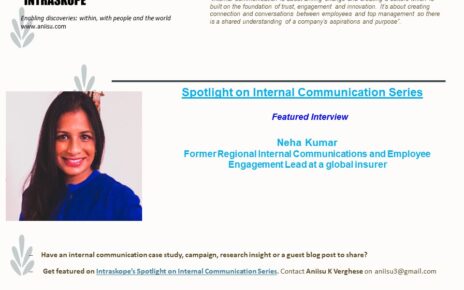This week I have been interviewing communicators for an internal communication role. I wanted to pen down my impressions from talking to a set of talented people, share do’s and don’ts and what I look for when it comes to hiring someone for a communications job. These ideas and recommendations I believe can apply for any profile and role.
At the time of publishing this post the position is still open and the selection process is underway.
Although the role has a mix of recruitment marketing communication and internal communication it will require the individual to work closely with internal stakeholders to develop, synchronize, disseminate and measure messages.
Here is what I did before conducting the interviews.
First, I did my due diligence by reading the CVs carefully to understand how the individual structured his or her profile and the key words highlighted. I made notes of the elements of experience, learning opportunities and array of roles played within the communication portfolio.
I sought writing samples from the candidates ahead of the interview since I firmly believe creating content and key messages are essentials for any communication position. I sifted through the samples to gauge the maturity of writing and the ability to express ideas succinctly.
Surprisingly, none of the profiles I reviewed included any element of social media to a) reference their background and, b) showcase their work.
When I called each of the candidates I ensured I provided the context, explained my role in the selection process and checked if they had clarity on the job description.
Strangely, only one of them had taken the trouble of finding out more about the role and how it correlated to the candidate’s experience. Interestingly, one asked me for feedback at the end of the interview – which to me demonstrated interest in growing and improving. I was asked what I look for when I interview a candidate for such a profile. I mulled over it and here is what came to my mind.
It boils down to what I call the ‘3Ds’ – is the individual driven, direct and distinguished.
Driven – is the candidate showing enough evidence of initiative and commitment?
Direct – is the candidate talking to the point? If you can’t explain your point crisply how can you communicate widely with your internal and external stakeholders?
Distinguished – has the candidate proved his or her worth in the domain?
If you have begun your career you may argue that you don’t have enough reasons and opportunities to make a mark. I disagree. If you are keen to make a mark and be recognized in your field of work, you should have begun early. Nothing stops you from building your portfolio of work even as a freelancer, enrolling for courses, joining a communication body, gaining experience with say, an NGO – without pay, penning articles for your local newspaper, writing a blog, hosting a photo feature, showcasing your video skills, demonstrating your leadership skills your college event or building your personal brand online.
Now coming to the questions I prefer asking during an interview. I try to holistically gauge the candidate at the following levels –
– personal (education, interest, hobbies etc)
– team (how they fit into the current scheme of things, how they engage with their team, whom they look to for insights and learning, whom do they report to, how do they manage work)
– organization (how are they making an impact to your organization, how do they know if they are doing so)
– career (expectations, understanding and awareness of opportunities available)
– industry (how aware are they of trends and impact)
– learning (what investment have they taken to grow, what are they doing to continuously learn more, do they have any mentors) and,
– personal attributes (how confident are they, is there clarity of thought, what are their impressions on ethics)
– community (what are they doing to improve things around themselves, in everyday life, what steps have they taken to make a difference)
At this point let me share some pointers on what one should avoid when applying and interviewing for a position.
1. Stating an incorrect designation and role: I noticed one CV which changed the current designation and role to suit the profile applied for. I only discovered this when I probed further that the candidate didn’t have the relevant experience.
2. Never bad mouth your current firm: When I asked what would make the individual switch companies, the answer that I got shocked me! The candidate used phrases like ‘lax attitude’, ‘not going anywhere here’ and does not matter how long I stay, nothing will change’. Which organization would want to hire someone who has such an attitude? Even if you are getting a raw deal in your current workplace, be thankful for the opportunities you get everyday to influence people and the work you do everyday.
3. Unclear about what the industry wants: If you are keen on making a mark in your area of work, you should positively know what is going on in your industry and the impact of regulations and governmental interventions. I made it a point to ask every candidate about recent trends they observed and I never got any convincing answers. If you don’t know of recent shifts in the way communication is evolving, how do you plan to value-add to how communication is done in your role?
4. Lack of clarity on career progression: It is the candidate’s responsibility to find out career paths and opportunities that exist in different organizations from literature that is available. There are tons of materials which one can refer to.
5. Beating around the bush: If you don’t know an answer, say so. No one is expected to know everything but the least I would expect is that the candidate tells me that he or she would find out, get my contact ID and let me know. When the expectation is to give simple, direct answers nothing can be more frustrating that listening to a candidate who beats around the bush.
6. Wanting to do other jobs within the company: While candor is appreciated, if you know the role does not suit you, explain it and drop off. I came across a candidate who wanted to play to her strengths in PR when the job clearly didn’t expect her to do so. You first need to prove your worth with what you are asked to do and then move to other domains if you get the opportunity.
7. Lack of interest in learning more: I was taken aback when candidates told me that they had absolutely no idea where to seek information on corporate communication or internal communication! It may have been excused 10-15 years ago when the understanding of communication was nascent. Today with a wide spectrum of options to source information from it is foolish to mention that one has no context! Even a simple Google search will get you all the content you need for a lifetime.
8. Do not place content in your CV that you can’t explain: If you mention ‘objectives’ or ‘strengths’ in your CV be prepared for questions related to them. For example, one candidate included ‘networking skills’ and I probed further for an example. Unfortunately, the candidate wasn’t able to give me a good example of a networking skill she leveraged to improve her standing. My recommendation is to drop these elements which bloat your CV length. Strengths will be discovered during the course of a conversation.
9. Don’t miss out on your manners: If you are in a place with a lot of background noise, excuse yourself and buy more time or do the call later. Also ensure you thank the interviewer for his or her time before signing off. Find out if you can continue keeping the relationship going in the future or if you can be mentored by the interviewer if you are convinced about the credentials.
What are your viewpoints? Do these recommendations make sense?
Do share your experiences and other ideas that you think will help a person interviewing for a communication role.



Didn’t you find a gap between the CV and the capabilities of the person. We need some kind of third party independent auditing authority who can evaluate the “true” credentials of candidates and especially their attitude. I find the gap in presentation and comprehension particularly glaring among communications candidates. Can we address this at the college level?
Good point Peter.
This is indeed something which needs addressing at the college level and as communicators each one of us can play a part.
By collaborating on curriculum development and imparting knowledge not just among students but also faculty.
I quite agree with Aniisu, save that most of the expectations listed down adopt a B school format.
Though I work in the industry at a junior level and do a good job daily (as my seniors report), my interviewer has to impress me as much as I’m expected to please them!
I was once asked if I’m into cars, sports or technology. These, if spoken about sound very cool. However, one has to know that these interests are a direct function of how monetarily tight my background has been! What if I say I learnt computing in my first job?
If i’m honest in my interview, that is the only thing I could sell. Else, people testing me are experts, veterans in the industry and will assess if I’m right or wrong. Also, see no harm in telling that plans on career progression are not in place, yet. If everyone plans, the world would be way neater than this!
The so-called problem lies at a national level within the education system.
They don’t prepare students for interviews in a particular way because the jobs offered that required such interview responses were quite frankly few and far in between so there was no great need. The emphasis was placed more on test scores and statistics more than anything.
And then you get Indian HR Officers or Recruitment Agencies who have worked abroad, incorporated western ideals or are foreigners themselves and they try to push their standards on Indian applications without any clue as to the current state of the job market, performance levels, interview trends etc.
There exists a wide gap here and one that needs to be addressed looking inwardly and with the focus on what India already has.
Well thought out. The piece might have been improved even more if it had listed associations and resources. Would have also liked to see real examples of a day in the life of a comm. pro. I like the emphasis on clarity, knowing exactly how one matches up with the expectations of a position.
Hello Sir,
Thanks for the detailed post, it’s very helpful!
Kindly suggest how a candidate can prove their merit on the basis of 3Ds as mentioned in an interview with an MNC , when she/he has experience of working in SMBs and internal communication isnt a separate function.
Thank you!
Good question Priyanka. Proving merit isn’t something one can do overnight. It takes time to be distinguished…but the other two ‘driven’ and ‘direct’ are behaviors which can be exhibited during the time of interview by showcasing what you have done and ‘how’ you have done them. It isn’t about the number of campaigns completed – it is about the ownership the candidate showed, the challenges that were overcome, the creative ideas which were crafted and the timely execution that matters. Internal communications is industry agnostic. The principles and fundamentals can be applied in any sector. Hope this helps.